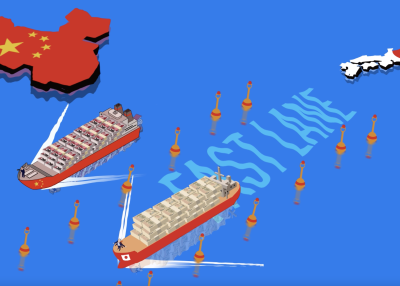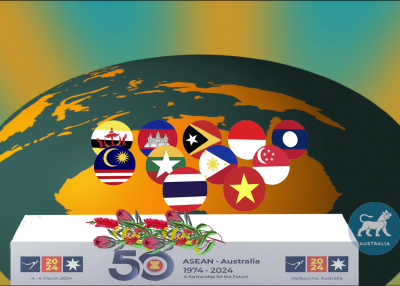Briefing MONTHLY #68 | November 2023
Climate pressures | Xi v Biden | Jokowi dynasty | Myanmar teeters | Bamboo ceilings | Asian banking | Shrinking IPEF | Bangladesh tensions
Animation by Rocco Fazzari.
GREENPLOMACY
It is now 30 years since the Rio de Janeiro Earth Summit put carbon emission reduction on the international diplomatic agenda with the now ubiquitous United Nations Framework Convention on Climate Change.
But as Prime Minister Anthony Albanese has faced rising domestic political heat for packing four different Indo-Pacific leadership meetings into a month, perhaps only one thing has been more intense: the expanding role of climate diplomacy at these events. While once these meetings might have been focused, for example, on farm trade, unstable currencies, or weapons treaties, just consider the prime minister’s briefing pack for the past month.
Washington: Australia doubled its support for the critical minerals used in green technologies to align itself with the Biden Administration’s big spending climate-focused industry policy which aims to reduce dependence on Chinese products.
Beijing: Australia dropped dumping tariffs on Chinese wind turbines which are necessary to implement the Labor government’s renewable energy transition commitments, but also paving the way for the withdrawal of Chinese trade impediments.
Aitutaki: At the Pacific Islands Forum, the government acknowledged the new concept of climate refugees just when unresolved issues over refugee detention were re-emerging at home. See: ASIAN NATION
San Francisco: At the Asia Pacific Economic Cooperation summit, China and the US paved the way to their own leaders’ summit with a joint statement on climate cooperation.
But the growing interaction between foreign and domestic policy driven by the demands of the climate transition are perhaps best captured in Treasurer Jim Chalmers flagship intervention into the global green industry policy debate: “We will complement not copy the priorities and plans of other nations … We won’t realise Australia’s unique geographical, geological, geopolitical, intellectual, and meteorological advantages by designing an Inflation Reduction Act Lite – looking only for big numbers but missing the bigger picture. Our plan will be ambitious, but uniquely Australian.” It’s worth a read.
And the persistent tensions between erstwhile allies Australia and Japan over the energy transition reverberated around the recent annual conference of businesses from those countries in a telling example of domestic climate interests roiling an otherwise close regional diplomatic relationship.
Also, this month, an interesting passing lane moment in the Australian business commitment to Asia. ANZ Bank has returned to celebrating its decades long exposure to the region just as Ramsay Healthcare has exited its two-decade old pioneering involvement in Southeast Asian hospitals. See: DEALS AND DOLLARS
Greg Earl
Briefing MONTHLY editor
NEIGHBOURHOOD WATCH
PACIFIC POWERPLAYS
The diplomatic language for living with China has been on steroids over the past month from Albanese’s multiple meetings with the world’s two most powerful leaders in Beijing and Washington to their own summit which overshadowed the Asia Pacific Economic Cooperation (APEC) group leaders’ meeting in San Francisco.
They ranged from US President Joe Biden’s advice that Albanese should “trust but verify” China’s promises, to Albanese’s emphasis on “communication” as the next step after the Labor government’s much sought “stabilisation” in the bilateral relationship with China. President Xi Jinping appeared to confirm that “stabilisation” had in fact now occurred by declaring that the two countries were at “a new starting point” and would now communicate in “a more mature way”.
Albanese and Xi agreed to restart an annual dialogue between leaders after seven years of impasse; the introduction of new visas for businesspeople; and the expansion bilateral trade which implied the remaining impediments to wine, red meat and lobster exports will soon be removed.
Xi and Biden agreed to open a presidential hotline; resume military to military communications; and cooperate to curb fentanyl production after their first face to face talks in a year. Echoing the language of Albanese’s meeting with Xi, Biden declared: “We’re back to direct, open clear direct communication on a direct basis.” And Xi observed less directly that: “Planet Earth is big enough for the two countries to succeed.”
But while there appeared to be common ground for stabilisation at the Albanese-Xi meeting, the Biden-Xi summit had more of an air of rivals politely talking past each other. So, while Biden said it was his responsibility to make the relationship “rational and manageable”, Xi argued the US should not “supress or contain” his country.
Biden and Albanese went into each of their meetings with Xi against the common background of differences amongst commentators (and presumably their advisers) about whether Xi is still the so-called “Chairman of everything” for good reason or is actually a leader with emerging feet of clay due to China’s escalating economic, demographic and possibly internal political weaknesses.
Commentators may be increasingly shifting towards the latter framing of China which, in Australia’s case, involves celebrating the failure of Chinese coercive trade measures. However, Biden was more old school and unwilling to retreat from simply calling Xi a dictator. Albanese, on the other hand, has been left flat-footed in the mooted new era of stablisation by his unwillingness to explain whether there has been any leadership communication over the Chinese intimidation of an Australian naval vessel off Japan.
- Asia Society’s Jing Qian says Xi’s speech to a business dinner after meeting Biden contained “a remarkable change in tone” towards the US which will send a positive signal to the Chinese system.
INDONESIA: father knows best
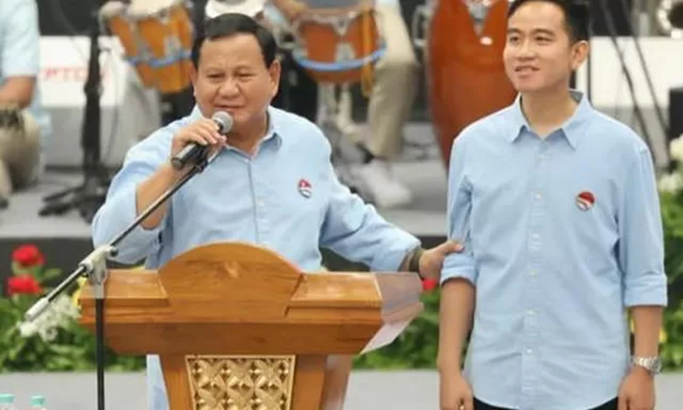
New team … Prabowo Subianto and Joko Widodo’s son Gibran Picture: kelumajang
Every president of Indonesia, apart from the mercurial B.J. Habibie, has sought to spawn some form of dynastic succession with mixed or unclear success. So, it should come as no surprise that Joko Widodo would trash his erstwhile cleanskin image by manipulating the country’s judiciary to push his son into next year’s succession race.
The battlelines for the February 14 vote are now clear with three-time presidential aspirant, elite family dynasty member, and incumbent defence minister Prabowo Subianto, 72, choosing Widodo’s eldest son Gibran Rakabuming Raka, 36, as his vice-presidential running mate. Choice may be the wrong word since Prabowo is well aware he needs to win over Widodo loyalists for his last tilt at the top job and Widodo is trying to retain some grip on power to protect his legacy. Gibran is now mayor of Surakarta where his father started out in politics. Prabowo is leading the opinion polls and has assembled the largest coalition of incumbent political parties.
Meanwhile Central Java governor Ganjar Pranowo, 55, has chosen security minister and lawyer Mahfud MD, 66, as his running mate. Apart from being a popular governor from Indonesia’s most populous province, Ganjar is counting on the support of the country’s largest political group the Indonesian Democratic Party of Struggle, which is the political arm of the country’s most prominent political dynasty – the Sukarno family.
The third ranked candidate is former Jakarta governor Anies Basweden, 54, who has chosen a former minister Muhaimin Iskandar, 57, as his running mate counting on him to deliver support from the National Awakening Party (PKB) which is associated with the country’s largest Muslim group. But Mahfud is also from that same cultural background complicating this strategy.
After a brief backlash against the choice of Gibran, the Prabowo camp is back leading opinion polls but there is a more competitive race between Ganjar and Anies to become the other participant in an expected second round presidential election in June.
- At New Mandala, Nathanael Sumaktoyo says Widodo has gone further than any predecessor in trying to elevate his children to high office.
MYANMAR: rare optimism
When once jailed economist Sean Turnell was preparing a month ago to promote his book about 650 days inside Yangon’s notorious Insein Prison he could not have imagined the backdrop.
It is almost three years since the election which triggered the military coup in Myanmar, but only in the past month have there been signs that the military regime is struggling to cope with the diverse opposition it now faces from various old ethnic armies, the armed democratic movement, defections from its own ranks, and possibly a changed position by China.
Ethnic armies have seized territory from the military regime in several parts of the country in an apparently, at least somewhat, coordinated approach which could strain the military’s capacity to respond. The successes will force neighbouring China and India to consider whether they should be preparing for a potential regime change of some form after tacitly accepting the coup. Western countries, including Australia, will also need to consider whether they should be providing more aid to the resistance forces and preparing for peacekeeping operations if the country fractures.
After preparing for a book tour on the basis that he had been fortunate to be released from jail but many of his old National League for Democracy government colleagues had not, Turnell is equally inspired and cautious about the latest developments. “The news in the last few days is hopeful. But I don’t want to get ahead of myself. We’ve spent 30 years getting here,” he told an event the Lowy Institute.
Turnell concedes that when he was working for the Aung San Suu Kyi government in 2016-20, he didn’t know the key members of the current National Unity Government in exile that has emerged in the past two years. But he says he has been surprised by their unity and lack of factionalism in a country where forces opposed to the various military governments have been notoriously fractious. “They are so much better on the Rohingya (minority Muslim) issue and the degree of cooperation amongst the ethnic groups,” he says, “China is all over the place and doesn’t know how long to back the regime.”
Turnell maintains contrary to some other commentators that Suu Kyi still has a future at 77 and could come back like Nelson Mandela in South Africa. But he says that she had acknowledged to him during their imprisonment that she recognised a new generation of young leaders had emerged to run the country.
- Priscilla Clap and Justin Tower, from the US Institute of Peace, say the latest resistance is significant because it reflects “a changed environment for plans to create a federal democracy” in Myanmar.
ASIAN NATION

Tuvalu’s Simon Kofe speaking to the UN
CLIMATE v COLONIALISM
It is almost 20 years since then Kiribati prime minister Anote Tong introduced a “migration with dignity” policy to allow his citizens to visualise a future elsewhere, when many Australian politicians were still arguing about whether climate change was actually happening.
But it took Tuvalu foreign minister Simon Kofe addressing the United Nations climate conference in 2021 knee deep in sea-water to really put a human face on the idea that some Pacific Islands nations may no longer be able to function due to rising sea levels.
While Prime Minister Anthony Albanese and Foreign Minister Penny Wong may differ slightly over whether it is the most significant Australian agreement with a Pacific nation ever or just the most significant since Papua New Guinea independence in 1975, the government has now made climate migration part of what used to be called the Pacific Step-up.
The Australia-Tuvalu Falepili Treaty signed on the sidelines of the Pacific islands Forum establishes a special visa to allow Tuvaluans to live, work and study in Australia; additional money to support climate adaptation; and gives Australia effective veto power over Tuvalu agreements with, for example, China.
The idea of Australia providing some form of compact with Pacific nations to provide refuge from climate change and take over some of their administrative functions has been talked about for many years. But there was a need to find a path between perceptions of neo-colonialism and avoiding the development of a Pacific ghetto in Australia.
The swift evolution of the Pacific labour schemes from short term to partly permanent now seems to have provided a pathway to potentially much greater integration. But questions still remain about how fast other countries – especially those with formal connections to China – will be prepared to accept the trade-offs in the Tuvalu arrangement.
- At Devpol, economist Stephen Howes says the Treaty paves the way for some form of Pacific visa. But former Tuvalu diplomat Jess Marinaccio says it may be seen as “highly neocolonial” and face new questions after the country’s election.
BAMBOO CEILING
Asian Australians are not being promoted to senior roles in the Australian Public Service equivalent to their population share despite government commitments to diversity and deeper engagement with the region.
A study of public service promotion trends over the past two decades shows that staff from a conventional English-speaking background are 70 per cent more likely to be promoted to executive-level roles, with people from Asian backgrounds least likely to be promoted.
The Crawford School of Public Policy study is the first to focus on promotional trends in the bureaucracy according to demographic background and suggests even Asian Australians who have lived in Australia since early childhood and who speak good English tend not to be promoted.
While the overall public service reflects the diversity of Australia, with about 20 per cent of staff from non-English speaking backgrounds (NESBs), about 96 per cent of promotions to the executive level have been awarded to staff with Anglo, Celtic or European names.
The study found that Asian-born NESBs who migrate to Australia before the age of six appear to do about as well as other migrants who arrive before the age of six. However, Asian-born NESBs who arrive after the age of five have worse promotion prospects than non-Asian NESB who arrive after the age of five. Asian-born NESBs who arrive before the age of six have similar promotion prospects to Asian-born NESBs.
The study argues: “These two results suggests that there is some ‘Asian penalty’ that is not related to language or cultural assimilation. Immigration itself does not hamper promotion prospects, as ESB individuals arriving after six years of age face similar promotion probabilities to their native-born counterparts.”
Noting that the ‘Asian penalty’ contrasts with the way women are being promoted in the public service due to gender equity measures, the study says the public service faces a productivity problem if there is discrimination against people for “looking Asian”.
DEALS AND DOLLARS
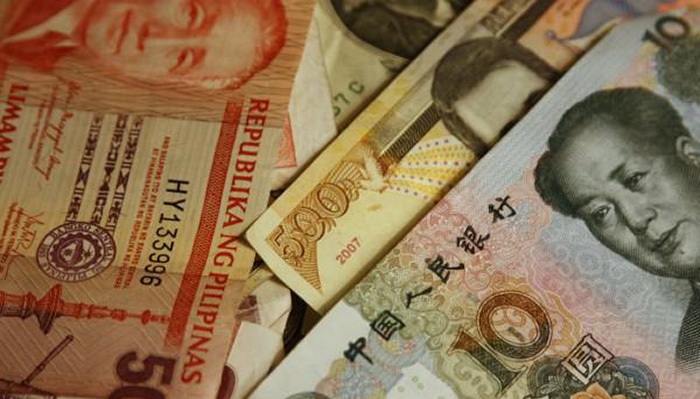
BANKING ON ASIA
The long Australian banking exodus from Asia appears to be undergoing a U-turn with Westpac deciding to stay in the Pacific and the ANZ now talking up its Asian business as a foundation for more competitive housing lending back home.
Announcing the bank’s latest annual report, ANZ chief executive Shayne Elliott said returns gained from banking large companies in India, Vietnam and Singapore were helping his bank compete more aggressively for Australian home loan customers.
For some years ANZ’s previous strategy of buying stakes in retail banks across the region was being blamed for poorer returns compared to its domestic competitors, forcing the bank to exit most of those investments to concentrate on providing less capital intensive trade finance in Asia.
The new more targeted strategy, which ties up less capital and less employees on the ground, appears to be paying off with the bank reporting a 14 per cent increase in full year cash profit to $7.4 billion, boosted by the performance from its commercial and institutional divisions. The trade finance lending now delivers higher profits than the bank makes writing home loans.
“The difference between Australian banks has never been more pronounced,” Elliott said in a significant shift in language from period when the bank was selling its subsidiary investments from Cambodia to Korea. “We have these other great strengths, and, of course we take that into account when we think about where to allocate capital.”
ANZ executives had previously said they would deploy more capital and assets in South-East Asia to target more transactional banking and payments revenues from large companies shifting supply chains into the region and investing in green energy. Institutional banking head Mark Whelan told The Australian Financial Review the bank was already investing heavily in a new technology platform for the region and in key personnel in Singapore, to take advantage of growth in the region.
Meanwhile Westpac has announced it has ended the long running attempt to sell its remaining Pacific banking interests and will now retain Westpac Fiji and Westpac Bank PNG Limited.
The move follows the Labor government’s efforts to encourage Australian companies to remain in the Pacific as part of the broader push to draw on all arms of statecraft to resist the growing Chinese presence in the region. The government support for Telstra to buy regional telecommunications company Digicel Pacific has raised the prospect of further soft lending to support other businesses in the region.
Westpac faced a dilemma selling its assets after PNG’s competition regulator prevented the sale of its business there to Kina Securities and it has struggled to find other buyers.
TURNING DOWN THE GAS
Japanese and Australian peak business groups have called on their governments to pay more attention to them in planning pathways to a zero emissions economy after several months of criticism of Australian government policy from Japanese officials and businesses.
The recently concluded 60th joint annual conference of Australia’s oldest bilateral Asian business chamber the Australia Japan Business Cooperation Committee (AJBCC) drew a record attendance amid the public tensions between the countries over Australia’s new moves on domestic gas reservation, new zero emission requirements for new projects, and commitments on energy transition by 2030.
In a rare public concession about the sense of uncertainty in the relationship, AJBCC chair Peter Grey, a former trade diplomat, even acknowledged as he closed the conference that “just when we were a little bit worried” about the state of the relationship it had “suddenly burst back to life here.”
The big business turnout may have reflected the 60th anniversary, the cancellation of meetings during the pandemic, and the substantial diversification of Japanese business interest in Australia beyond resources into everything from life insurance to digitised used car sales. But the quietly spoken explanation amongst delegates was that it was a show of Japanese capital power to the Albanese government when Australia’s energy transition is running slower than planned.
No less than three Australian ministers met Japan’s Minister of Economy, Trade and Industry Yasutoshi Nishimura on the first day of the gathering to smooth things over. It was a case study in how Japan’s existential angst over energy security really drives the relationship despite the recent new focus on defence cooperation.
And so Australian speakers talked up the extensive scientific cooperation with Japan over the years and the opportunities for Japan to secure its own energy transition by investing in Australia’s much hyped hydrogen development plans. But Japanese speakers tended to emphasise the need for liquified natural gas to remain a greenish transition fuel to a 2050 net zero environment and the need for advocates of a social licence for resources development to understand the costs of an excessively fast transition.
In the end a closing statement noted that trade and investment in energy remained the cornerstone of the bilateral business relationship and that bilateral energy trade in 2022 had reached record levels, substantially underpinning Japan's energy security amid the tensions.
It said: “Our countries' shared commitment to achieve carbon neutrality by 2050 presents challenges for this commerce, but also huge opportunities for new areas of joint effort … Delegates stressed that business will be indispensable in driving and implementing a path to carbon neutrality by 2050 that will assure the energy security of both countries; but also, that business needs enduring policy certainty as the basis for long-term investment decisions.”
But former Japanese energy official and now Institute of Energy Economics chief executive Tatsuya Terazawa has maintained the Japan Inc pressure on the Albanese government’s energy transition policies during a visit to Australia as the Asia Society Australia-Victoria distinguished fellow. He told The Guardian: “We understand the necessity for any country to introduce measures to reduce CO2 emissions but we want to make sure that those regulations will be respectful of the legitimate concerns of the investors so that companies can smoothly comply.”
RAMSAY’S HOSPITAL PASS
When then Indonesian President Susilo Bambang Yudhoyono visited Sydney in 2010, the entrepreneur Paul Ramsay was part of an elite group of about five Australian businesspeople to meet him privately.
The conservative, Catholic Ramsay, who died in 2014, was a little appreciated and somewhat unlikely supporter of engagement with Indonesia, but backed the idea with involvement in managing hospitals there starting in the early 2000s. That connection with what is now seen as a high priority for bilateral economic engagement by the Australian government is now over with the sale of Ramsay Sime Darby Health Care to Columbia Asia Healthcare for $1.9 billion.
Ramsay Sime Darby operated four hospitals in Malaysia and three in Indonesia after the joint venture was established in 2013 to hold the pre-existing Ramsay Indonesian institutions. Columbia Asia’s main shareholders are the US private equity group TPG Inc and the Malaysian conglomerate Hong Leong Group, with support from the Abu Dhabi Investment Authority and Malaysia’s Employees Provident Fund. It has 22 hospitals in the region underlining the sort of competition Australian interests face in pursuing healthcare investments in Southeast Asia.
Ramsay’s offshore healthcare investment will now be concentrated in Britain and Europe, while Sime Darby has pulled back to its longstanding core industrial interests in Malaysia. Aspen Medical will now be the flagbearer for Australian investment in Southeast Asian health care with its involvement in the development of a series of hospitals in Indonesia’s West Java province.
SELLING THE FARM
The mooted sale the agriculture fertiliser arm of Incitec Pivot to Indonesia’s Pupuc Kaltim seems likely to proceed with the company’s acting chief executive Paul Victor confirming a buyer had completed due diligence.
Incitec Pivot had been planning to separate its fertiliser and explosives businesses but a sale of the fertiliser business has emerged as an apparently more favoured alternative amid a profit slump.
An Indonesia purchase would represent a step up the momentum of Indonesian investment in Australia when the Albanese government is trying to foster greater two-way investment and might contribute to a more integrated agriculture supply chain between the two countries. But it could be sensitive for an Indonesian company to be controlling a key input to farm production in Australia.
DATAWATCH
CONNECTED: Asian social media use
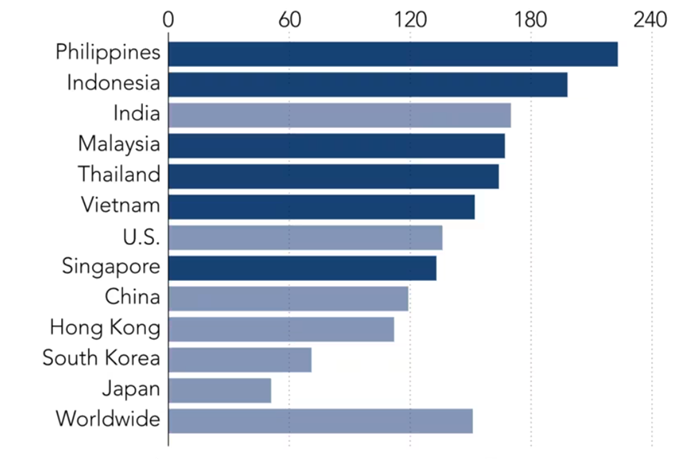
Average minutes spent online/day
Source: We Are Social/Nikkei Asian Review
DIPLOMATICALLY SPEAKING
"This framework (Indo-Pacific Economic Framework) is a commitment to working with our close friends and partners in the region on challenges that matter most to ensuring economic competitiveness in the 21st century."
- US President Joe Biden (May 22, 2022)
"Today … we signed up to the Indo-Pacific Economic Framework. It has 13 countries, of which eight of Australia's top 10 trading partners are involved in it. It’s just another way that the Quad can reach out."
- Prime Minister Anthony Albanese (May 24, 2022)
"We resolved to align implementation of the Indo-Pacific Economic Framework and Invested: Australia's Southeast Asia Economic Strategy to 2040 to boost investment in energy transition and other strategic sectors and build supply chain resilience."
- Joint Statement by Biden and Albanese (October 25, 2023)
"It’s important that the United States engage in a trading relationship in our region. So, the document I signed today is the first of four pillars, and we are hoping to make significant progress on the remaining pillars over the next couple of days."
- Trade Minister Don Farrell (November 15, 2023)
"I’ve made it very clear that the trade portion of the Indo-Pacific Economic Framework is unacceptable, and I’m glad it’s not moving forward. Instead of negotiating trade deals behind closed doors, we should be working to strengthen enforcement so that American workers can compete on a level playing field."
- US Senator Sherrod Brown (November 15, 2023)
"We still have a lot to do, but we’ve made substantial progress."
- Biden (November 16, 2023)
"Well, when you’ve got three out of four (pillars) you’re doing pretty well. Trade agreements are difficult."
- Albanese (November 16, 2023)
ON THE HORIZON

BANGLADESH SHOWDOWN
Asia’s fifth most populous country will go to the polls on January 7 amid increasingly intense legal disputes and popular protests over longstanding incumbent Prime Minister Sheikh Hasina’s management of the process.
She has rejected calls for the election to be overseen by a caretaker government prompting threats from the opposition Bangladesh Nationalist Party (BNP) that it would boycott the vote. On the weekend a court ruled that the smaller Muslim-based opposition party Jamaat-e-Islami could not take part because it has broken secularism rules.
Hasina, the daughter of the country’s assassinated independence leader, has served a total of 19 years as prime minister and has now been in power in effect consistently since 2009 at the head of the Awami League. She is the world’s longest serving female leader.
The Bangladesh economy has been growing amongst the fastest in Asia in recent years due to a booming textiles export sector. But the government has also been coming under more criticism for its tight control of the country and crackdowns on opposition figures despite being embraced as a potential bulwark against China’s rise.
About 100 million voters from the country’s 172 million people will be choosing 300 members of the Jatiya Sangsad in single member seats and an additional 50 seats reserved for women. The Awami League-led Grand Alliance won 258 seats last time.
ABOUT BRIEFING MONTHLY
Briefing MONTHLY is a public update with news and original analysis on Asia and Australia-Asia relations. As Australia debates its future in Asia, and the Australian media footprint in Asia continues to shrink, it is an opportune time to offer Australians at the forefront of Australia’s engagement with Asia a professionally edited, succinct and authoritative curation of the most relevant content on Asia and Australia-Asia relations. Focused on business, geopolitics, education and culture, Briefing MONTHLY is distinctly Australian and internationalist, highlighting trends, deals, visits, stories and events in our region that matter.

